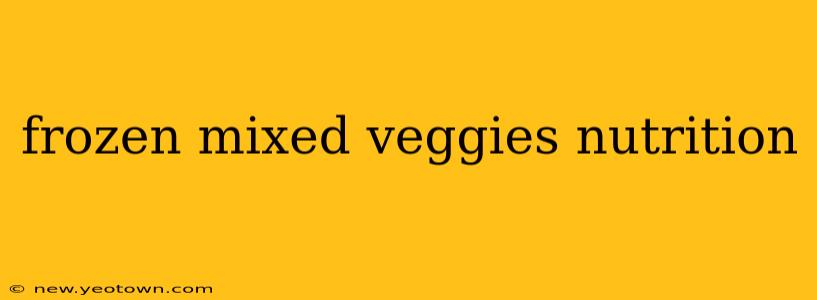Let's be honest, sometimes the allure of fresh, vibrant vegetables fades when faced with a busy schedule. That's where frozen mixed vegetables step in, saving the day (and your nutritional intake!). Often overlooked, these convenient little packages pack a surprisingly potent nutritional punch. This isn't just about convenience; frozen mixed vegetables offer a surprisingly diverse and healthy addition to your diet. This comprehensive guide will delve into their nutritional benefits, address common concerns, and help you make them a regular part of your healthy eating plan.
What are the nutritional benefits of frozen mixed vegetables?
Frozen mixed vegetables typically contain a blend of common vegetables like peas, carrots, corn, green beans, and sometimes others like broccoli or lima beans. The nutritional profile varies depending on the specific blend, but generally, you're getting a good source of vitamins, minerals, and fiber. Think of it as a mini-vegetable garden conveniently packed for your freezer.
Many wonder if freezing diminishes the nutritional value. While some nutrient loss does occur during harvesting, processing, and freezing, the difference compared to fresh vegetables is often minimal, especially when you consider that frozen vegetables are often flash-frozen soon after harvesting, locking in many of their nutrients. In some cases, frozen vegetables can even have higher nutrient levels than their fresh counterparts that have been sitting in a grocery store for days, losing nutrients with each passing hour.
Are frozen mixed vegetables as healthy as fresh vegetables?
This is a common question, and the short answer is: it's complicated! While fresh vegetables are undeniably great, frozen mixed vegetables offer a compelling alternative. Studies have shown that frozen vegetables retain a significant portion of their vitamins and minerals, often comparable to, and sometimes exceeding, the nutrient content of fresh vegetables that have been stored for extended periods. The key difference is timing – frozen vegetables are often flash-frozen at their peak freshness, preserving a significant portion of their nutritional value.
What vitamins and minerals are in frozen mixed vegetables?
The specific vitamin and mineral content will depend on the exact blend, but you can generally expect to find:
- Vitamin A: Essential for vision, immune function, and cell growth (particularly from carrots).
- Vitamin C: A potent antioxidant crucial for immune health and collagen production (found in green beans and peas).
- Vitamin K: Important for blood clotting and bone health (present in green leafy vegetables if included in the mix).
- Folate: Crucial for cell growth and development, especially during pregnancy (peas and green beans are good sources).
- Potassium: Helps regulate blood pressure and fluid balance (present in many vegetables).
- Fiber: Promotes digestive health and can help regulate blood sugar levels.
How to choose the best frozen mixed vegetables?
When selecting your frozen mixed vegetables, look for bags with minimal added ingredients. Avoid options with excessive amounts of sodium, butter, or sauces. The simpler the better! Check the ingredient list to ensure you understand what you're buying and that it aligns with your dietary needs and preferences.
Can frozen mixed vegetables be part of a healthy diet?
Absolutely! Frozen mixed vegetables are a versatile and convenient addition to any healthy diet. Their nutritional value, coupled with their ease of use, makes them an ideal option for busy individuals or those seeking to incorporate more vegetables into their meals. They can be added to soups, stews, stir-fries, or enjoyed as a simple side dish.
By incorporating frozen mixed vegetables into your diet, you’re not just adding convenience – you’re adding a nutritional boost that supports your overall health and well-being. So next time you’re at the grocery store, don't overlook the frozen food aisle; it’s a treasure trove of healthy and delicious options.

